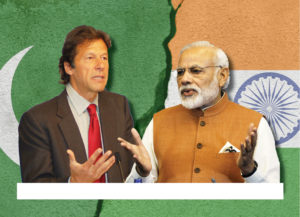By Abigail Stowe-Thurston, Program Coordinator
 Indian Defense Minister Rajnath Singh made comments last week that seem to draw the credibility of India’s nuclear No First Use policy into question. He said, “What happens in the future depends on the circumstances.” The statement comes amid rising tensions between India and Pakistan.
Indian Defense Minister Rajnath Singh made comments last week that seem to draw the credibility of India’s nuclear No First Use policy into question. He said, “What happens in the future depends on the circumstances.” The statement comes amid rising tensions between India and Pakistan.
In February, Pakistan-based terrorist group Jaish-e-Mohammed attacked a convoy of vehicles in Kashmir, killing 40 security personnel. A decree issued by Indian Prime Minister Narendra Modi earlier this month revoked the autonomy of the Muslim-majority state of Jammu and Kashmir and partitioned it into two federal territories. The government has imposed strict restrictions on residents, including restricting movement and shutting down internet and cellular networks. Amid these rising tensions, casting doubt on India’s continued adherence to a No First Use policy threatens to make a bad situation even worse.
India uses conventional and nuclear threats to deter Pakistan from engaging in aggressive actions against it, but its NFU policy signals a level of nuclear restraint. Pakistan is also nuclear-armed, and retains the option to use nuclear weapons first. India is not party to the Non-Proliferation Treaty, so maintaining a position that it will only use nuclear weapons to respond to a nuclear attack is a politically valuable way to demonstrate that it is a responsible actor.
Some experts question the credibility of India’s No First Use policy, noting that past officials have considered the potential benefits of adopting a more ambiguous nuclear doctrine. A clear abandonment of NFU, however, would be an inflammatory move. Rather than strengthening deterrence, shifting to a policy that allows for nuclear first use will fuel its neighbor’s fears about escalation.
For now, No First Use remains India’s official policy. The Modi government should refrain from resorting to nuclear threats, and instead focus on upholding and strengthening its commitment not to use nuclear weapons first. While Pakistani officials generally voice support for the country’s current policy, former President Asif Ali Zardari expressed support for NFU in 2008. In the current security environment, Pakistan should revisit the possibility of shifting to a No First Use policy to improve stability and reduce the chances that nuclear weapons are ever used.
